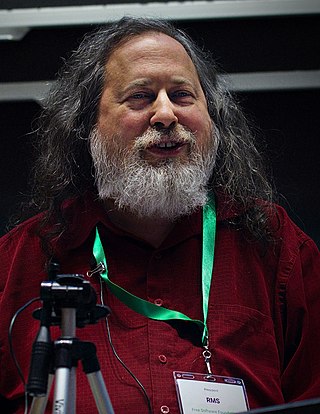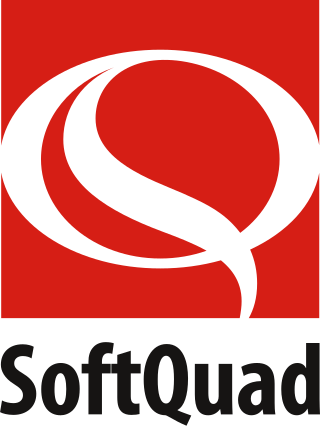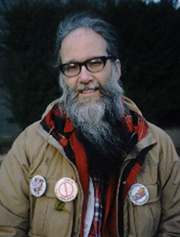
Douglas Carl Engelbart was an American engineer and inventor, and an early computer and Internet pioneer. He is best known for his work on founding the field of human–computer interaction, particularly while at his Augmentation Research Center Lab in SRI International, which resulted in creation of the computer mouse, and the development of hypertext, networked computers, and precursors to graphical user interfaces. These were demonstrated at The Mother of All Demos in 1968. Engelbart's law, the observation that the intrinsic rate of human performance is exponential, is named after him.

Hypertext is text displayed on a computer display or other electronic devices with references (hyperlinks) to other text that the reader can immediately access. Hypertext documents are interconnected by hyperlinks, which are typically activated by a mouse click, keypress set, or screen touch. Apart from text, the term "hypertext" is also sometimes used to describe tables, images, and other presentational content formats with integrated hyperlinks. Hypertext is one of the key underlying concepts of the World Wide Web, where Web pages are often written in the Hypertext Markup Language (HTML). As implemented on the Web, hypertext enables the easy-to-use publication of information over the Internet.

Theodor Holm Nelson is an American pioneer of information technology, philosopher, and sociologist. He coined the terms hypertext and hypermedia in 1963 and published them in 1965. According to a 1997 Forbes profile, Nelson "sees himself as a literary romantic, like a Cyrano de Bergerac, or 'the Orson Welles of software'."

Johns Frederick (Jeff) Rulifson is an American computer scientist.

Heydar Alirza oghlu Aliyev was an Azerbaijani politician who served as the third president of Azerbaijan from October 1993 to October 2003. Originally a high-ranking official in the KGB of the Azerbaijan SSR, serving for 28 years in Soviet state security organs (1941–1969), he led Soviet Azerbaijan from 1969 to 1982 and held the post of First Deputy Premier of the Soviet Union from 1982 to 1987.

Free Software Foundation (FSF) grants two annual awards. Since 1998, FSF has granted the award for Advancement of Free Software and since 2005, also the Free Software Award for Projects of Social Benefit.

The EFF Pioneer Award is an annual prize by the Electronic Frontier Foundation (EFF) for people who have made significant contributions to the empowerment of individuals in using computers. Until 1998 it was presented at a ceremony in Washington, D.C., United States. Thereafter it was presented at the Computers, Freedom, and Privacy conference. In 2007 it was presented at the O'Reilly Emerging Technology Conference.

The Grace Murray Hopper Award has been awarded by the Association for Computing Machinery (ACM) since 1971. The award goes to a computer professional who makes a single, significant technical or service contribution at or before age 35.
Holley Rubinsky was an American-born Canadian fiction writer who lived in Kaslo, British Columbia.

Richard Saul Wurman is an American architect and graphic designer. Wurman has written, designed, and published 90 books and created the TED conferences, the EG Conference, and TEDMED.
Yuri Ivan Rubinsky was a Lebanese-born writer, software executive, and promoter of the Standard Generalized Markup Language (SGML), which was the basis for the now-ubiquitous XML. In Canada, he is probably best known as founding co-director of the Banff Publishing Workshop and for his work in applying technology to help visually impaired people. The Yuri Rubinsky Memorial Award was created posthumously in his memory.

Richard Matthew Stallman, also known by his initials, rms, is an American free software movement activist and programmer. He campaigns for software to be distributed in such a manner that its users have the freedom to use, study, distribute, and modify that software. Software that ensures these freedoms is termed free software. Stallman launched the GNU Project, founded the Free Software Foundation (FSF) in October 1985, developed the GNU Compiler Collection and GNU Emacs, and wrote all versions of the GNU General Public License.

SoftQuad Software was a Canadian software company best known for HoTMetaL, the first commercial HTML editor. It is also known for Author/Editor, the first specialized SGML editor, and Panorama, the first browser plugin for SGML. Panorama demonstrated the need for standardization of SGML on the web, which eventually resulted in the development of the XML specification.

Leonard "Len" H. Tower Jr. is a free software activist and one of the founding board members of the Free Software Foundation, where he contributed to the initial releases of gcc and GNU diff. He left the Free Software Foundation in 1997.
The Lannan Literary Awards are a series of awards and literary fellowships given out in various fields by the Lannan Foundation. Established in 1989, the awards are meant "to honor both established and emerging writers whose work is of exceptional quality", according to the foundation. The foundation's awards are lucrative relative to most awards in literature: the 2006 awards for poetry, fiction and nonfiction each came with $150,000, making them among the richest literary prizes in the world.
The Special Interest Group on Computer–Human Interaction (SIGCHI) is one of the Association for Computing Machinery's special interest groups which is focused on human–computer interactions (HCI).
The Free Software Foundation (FSF) is a 501(c)(3) non-profit organization founded by Richard Stallman on October 4, 1985, to support the free software movement, with the organization's preference for software being distributed under copyleft terms, such as with its own GNU General Public License. The FSF was incorporated in Boston, Massachusetts, US, where it is also based.
SIGWEB is a Special Interest Group of the Association for Computing Machinery (ACM) on hypertext, hypermedia, and the World Wide Web. SIGWEB was named SIGLINK until November 1998.
LibrePlanet is a community project created and supported by the Free Software Foundation. Its objective is the promotion of free software around the world by bringing every year an international conference to local communities and organizations.
The ACM Conference on Hypertext and Social Media (Hypertext) is one of the oldest international conference series on the crossroads of Human-Computer Interaction and Information Science. The full list of conferences in the series can be found on the Association for Computing Machinery Hypertext Web page, and papers are available through the ACM Digital Library.











